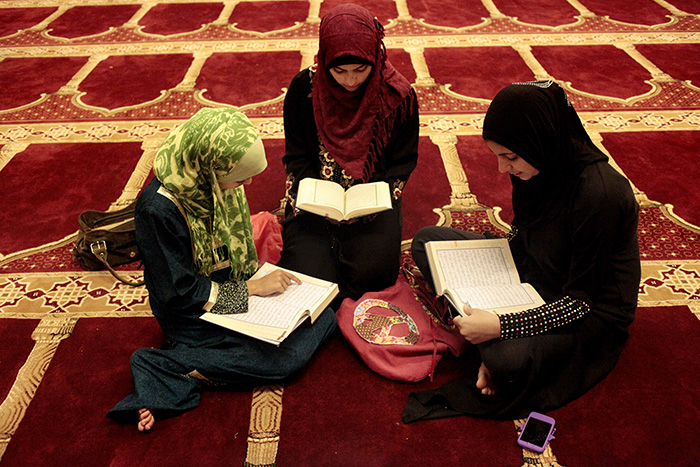Debate of Imam Javad (a.s) With Yahya Bin Aksam
[dropcap]O[/dropcap]ne day Imam Muhammad Taqi (a.s), then aged nine, was standing with some boys in a lane of Baghdad. Seeing the entourage of Mamun all the others ran away, but as was his habit, Imam (a.s) continued to stand at his place. Mamun came forward and asked him, “Boy! Why did you not run away?” He replied, “O Chief! The passage was not narrow. There was no expectation that you would punish an innocent person. Then why should I run away?” Mamun liked this explanation and he asked the name of this boy and that of his father. He said, “I am Muhammad and Imam Ridha’ (a.s) was my respected father.” Mamun was moved by his condition and he spurred his horse forward. At that time he was going for hunting and he had some falcons with him. When he left the habitations he released a falcon to pursue a partridge. The falcon disappeared and returned after sometime carrying a small fish in its beak.
Mamun was greatly astounded. On his return he found the boys playing. All ran away except Imam Muhammad Taqi (a.s). Mamun approached him and asked, “Tell me, what I hold in my hand?” He replied, “The Almighty Allah has created little fishes in the sea of His power that the falcons of the kings prey upon and inform the sons of the Ahl ul-Bayt of the Prophet.”
Debate of Imam Javad (a.s) With Yahya Bin Aksam
All the Islamic history books mention this debate in detail. This gathering was held on such a magnificent scale that in addition to the nobles of the ruling class, 900 chairs were occupied with scholars and great men of learning and such people as the Arabs were proud of their intellectual accomplishments. Imam Muhammad Taqi (a.s) who was educated in the divine school could never be afraid of such people.
When the court was filled with the people, Mamun called Imam Muhammad Taqi (a.s) and had him seated besides him on the royal throne and pillows placed on both his sides. Qadi Yahya bin Aksam was also present in his seat. He said, “If you allow me, can I pose a few questions to this lad?” Mamun said, “Your good manners demand that you seek his own permission.” Yahya sought the Imam’s leave, which was granted immediately.
Yahya: What is the penalty for the one who hunts in the condition of Ehram.7
Imam: (Smiling) This question is absolutely absurd. First tell me, where this person hunted? In the surrounding area or inside the holy sanctuary? Whether he was aware of this matter or ignorant? Whether he did it willingly or by mistake? Whether he was a slave or a freeman? A matured person or a child? Did he do it first time or he had done it before also? Whether the hunted one was a bird or a quadruped? Small or big? Was the hunter regretful of his action or elated? Was the hunt conducted during the night or in the day? Was he wearing Ehram for Hajj or for Umrah?
Just as the Qadi heard these words he was speechless. The color of his face paled. Darkness appeared below his eyes. He continued to sit shocked. When the silence prolonged, Mamun could not restrain himself. He said to the Imam, “Now that you have told this, please also throw some light on its solution.”
Imam: If a person in Ehram hunts in the surrounding area and the prey is a bird, even if it is big, the penalty of the same is a goat. If he hunts a similar prey in the sanctuary, the penalty is two goats. If a young one of a wild animal is hunted in Ehram a ram is to be given as penalty. It should be one that is no more suckled by its mother. If the hunt is that of a deer a goat is to given as penalty and all these penalties apply for hunting wild animals in the surrounding areas.
However, if it is done in the sanctuary the penalty would be doubled. And one who gives the penalty has himself to take the animals to the Ka’ba. If this person is wearing Ehram for Hajj he should slaughter these animals in Mina, if he is wearing Ehram for Umrah, he should slaughter then in Mecca.
The aware and the ignorant are equally liable. One who does it willingly and knowingly is a sinner. Although in event of ignorance there is no sin. For a freeman the penalty is liable on himself, and the penalty of a slave is obligatory upon his master. There is no penalty on a small child. Penalty is incumbent on a matured person.
One who regrets this hunting would be saved from the punishment of the Hereafter. And if he is elated at his deed the punishment of the Hereafter is also there for him.
Hearing the reply the whole gathering was astounded and accolades and congratulations arose from everywhere. Mamun was so happy that he continued to repeat again and again, “Allah best knows where to place His message.”
After this Imam (a.s) asked Qazi Yahya, “Now let me ask you a question.” Mamun said, “Ask him, indeed.”
Imam said, “What do you say regarding this problem? A man looked towards a woman while she was prohibited for him. She became lawful at sunrise, unlawful at noon, again lawful in the afternoon, unlawful at sunset and lawful at night. Again unlawful in the middle of the night and then finally lawful in the morning?
Since Yahya was helpless, the Imam explained, “She was a slave-girl whom he purchased in the morning and she become lawful for him, at the noon time he freed her and she became unlawful for him. In the afternoon he married her.
At Sunset he recited the words of Zihar (that she is to him like the back of his mother) and she became unlawful for him. In the night he paid the penalty and she became lawful for him again. During the night he gave her a revocable divorce and she became unlawful for him and finally he took her back nullifying the divorce in the morning, making her lawful for himself.”
Mamun told the people, “Have you seen the level of his knowledge?”




